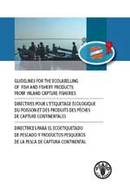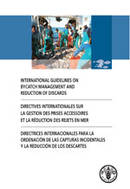Publications
The Guidelines for the Ecolabelling of Fish and Fishery Products from Inland Capture Fisheries are of a voluntary nature. They are applicable to ecolabelling schemes that are designed to certify and promote labels for products from well-managed inland capture fisheries and focus on issues related to the sustainable use of fisheries resources. The guidelines refer to principles, general considerations, terms and definitions, minimum substantive requirements and criteria, and procedural and institutional aspects of ecolabelling of...
These International Guidelines on Bycatch Management and Reduction of Discards were developed through a participatory process involving fisheries experts, fishery managers from governments, the fishing industry, academia and non-governmental and intergovernmental organizations.
The guidelines are designed to provide guidance on management factors ranging from an appropriate regulatory framework to the components of a good data collection programme, and include the identification of key management considerations and measures necessary to ensure the conservation of target and non-target...
Global production from aquaculture is growing substantially and provides increasingly significant volumes of fish and other aquatic food for human consumption, a trend that is projected to continue. Although aquaculture growth has potential to meet the growing need for aquatic foods and to contribute to food security, poverty reduction and, more broadly, to achieving sustainable development and the Millennium Development Goals, it is increasingly recognized that improved management of the sector is necessary to achieve...
Fisheries, including aquaculture, provide a vital source of food, employment, recreation, trade and economic well-being for people throughout the world, both for present and future generations and should therefore be conducted in a responsible manner.
To promote long-term sustainable fisheries, in 1995 the FAO Conference adopted the FAO Code of Conduct for Responsible Fisheries.Afterwards, in 2011, FAO published the Code of Conduct for Responsible Fisheries - Special Edition. This special edition of the Code of Conduct for Responsible Fisheries...
Social and biophysical dimensions of ecosystems are inextricably related such that a change in one dimension is highly likely to generate a change in the other. Although change is a natural consequence of complex interactions, it must be monitored and even managed if the rate and direction of change threatens to undermine system resilience.
"An ecosystem approach to aquaculture (EAA) is a strategy for the integration of the activity within the wider ecosystem such that it promotes sustainable development, equity,...






